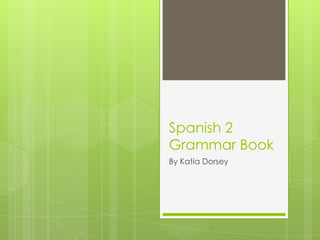
Grammar book by Katia Dorsey
- 1. Spanish 2 Grammar Book By Katia Dorsey
- 2. Table of Contents 1. Nationalities 2. Stem Changing Verbs 3. Para 4. Indirect Object Pronouns 5. Object Pronoun Placement 6. Gustar 7. Affirmative and Negative 8. Superlatives 9. Reflexives 10. affirmative tu commands + irregulars + pronoun placement 11. negative tu command + irregulars + pronoun placement 12. sequencing events
- 3. argentino mexicano costarricense uruguayo nicaragüense cubano venezolano colombiano peruano dominicano paraguayo puertorriqueño chileno ecuatoriano boliviano hondureño guatemalteco salvadoreño español guineano panameño Nationalities 1
- 4. Boot verbs o-ue, Stem Changers e-ie, e-i, oThe stem does not change for the nosotros (we) u-ue or vosotros (you) form! oExamples: oPensar - e-ie to think, to plan pienso pensamos yo nosotros piensas pensáis vosotros tu piensa piensan El, ella, U Ellos, ellas, o Pedir- e-i to ask for, to order Uds. o?Pido un postre y lo compartimos? d. 2 Should I order dessert and we’ll share it?
- 5. Para To mean "in order to" followed by an infinitive. Examples: Viajamos para aprender español. (We travel in order to learn Spanish.) Vive para comer. (He lives in order to eat.) To indicate purpose, intent, usefulness or need Examples: Estudia para dentista. (She is studying to become a dentist. Quisiera una bicicleta para dos. (I'd like a bicycle for two.) 3
- 6. Indirect Object Pronouns To identify the indirect object use our two guidelines: The IO tells us where the DO is going. The IO answers the question "to whom?" or "for whom" the action of the verb is performed. Examples: Lucy me compra un regalo. Lucy buys (for) me a gift. Use these pronouns: Lucy te compra un regalo. Lucy buys (for) you a gift. me nos Lucy le compra un regalo. Lucy buys (for) her a gift. Lucy nos compra un regalo. te os Lucy buys (for) us a gift. Lucy os compra un regalo. Lucy buys (for) you-all (familiar) a gift. le les Lucy les compra un regalo. Lucy buys (for) them a gift. 4
- 7. Object Pronoun Placement Attach the pronoun to Examples for Inderect the infinitive Objects: 1. oRosa le compra una olla a Attach the su madre. Attach the Object pronoun to Rosa buys her mother a pot. pronoun to 2. Pronoun Placement 4. an progressive affirmative command oRosa quiere comprarle una 3. olla a su madre. Rosa wants to buy her mother a pot. Place the pronoun before the conjugated verb 5
- 8. Les Gustar gusta *** The form of gustar To like/ to please Os matches the noun, not gusta Me Nos the speaker! gusta Te Le gusta gusta gusta Examples: Matches singular noun •Me gusta mucho tu idea para el concurso. I like your idea for the contest lot. Matches plural noun •Me gustan las enchiladas. 6 I like enchiladas.
- 9. Affirmative and Negative Words oAffirmatives: oNegatives: oAlgo something o Nada nothing oAlguien someone o Nadie no one oAlgún, alguno same o Ningún, ninguno none, not any oSiempre always o Nunca never oTambién also o Tampoco neither, either Examples: A double negative is ?Algo de tomar? required when Something to drink? Nadie quiere postre. no procedes the No one wants dessert. verb. Por Ahora, nada más. For now, nothing more. No quiero nada. I don’t want anything. 7
- 10. Superlatives Used to express extremes with adjectives and adverbs. Drop the vowel then add –ísimo(a) or –ísimos (as) Example: La idea de Rosa es interesantísima. Rosa’s idea is very (extremely) interesting. ***Changes are required when the last consonant is c, g, or z. c qu rico riquísimo g gu largo(a) larguísimo z c feliz felicísimo 9
- 11. Reflexives The subject 1. In front of a conjugated verb… is also the -Me acuesto a las diez de la noche. -Me estoy acostando ahora mismo. object! 2. Attached to a gerund… -Estoy acostándome ahora mismo. -Luisa está cepillándose los dientes. 3. Attached to an infinitive… ir + a + infinitive -Voy a acostarme ahora mismo. -Luisa va a cepillarse os dientes. ***The subject, the pronoun, and the verb are all in the same form. Levantarse: Lavarse: Acostarse: Me levanto Nos Me lavo Nos lavamos Me acuesto Nos acostamos levantamos Te levantas Os levantáis Te lavas Os laváis Te acuestas Os acostáis 10 Se levanta Se levantan Se lava Se lavan Se acuesta Se acuestan
- 12. Affirmative tu commands + Irregulars + Pronoun placement Rules for affirmative tú commands: 1. Change the verb to the tú form 2. Drop the “s” ***The pronoun attaches to the command. Examples: Ex. ¡Ponte otra camisa! Caminar ¡Camina! Put on yourself another shirt! Comer ¡Come! Abrir ¡Abre! o Affirmative Irregulars: oDecir- di Examples: oHacer- haz Do it! Hacer ¡Hazlo! oIr- ve oPoner- pon oSalir- sal Eat it! Comer ¡Cómelo! oSer- sé oTener- ten oVenir- ven 11
- 13. Negative tu command + Irregulars + Pronoun placement Rules for negative tú commands: 1. Put the verb into yo form 2. Change the vowel (a-e, e-a) 3. Add an ”s” Examples: Poner- yo pongo- no pongo- ¡No pongas! Comer- yo como- no como- ¡No comas! Hablar- yo hablo- no hablo- ¡No hables! Negative Irregulars: T. Tener no tengas V. Venir no vengas ***Object pronouns precede the verbs. D. Dar/decir no des/no digas Example: I. Ir no vayas ¡No lo uses! S. Ser no seas Don’t use it (the blowdryer). H. Hacer no hagas E. Estar no estés S. Saber no sepas 12
- 14. Sequencing Events- tells when something is prior to something else primero entonces then por fin also Mañana morning Por la… Tarde In/during the evening Noche night Antes de before Despues de / luego after Los Lunes, etc…. On Monday, etc. 13